CALIBAN Design Inspirations
Here’s a meaty post on my thoughts on some inspirational game design mechanics and how they will relate to Caliban.
What am I suppos- oh I died...
My definition of a survival game is as follows: A sudden-death system which pits the user against an increasing set of challenges while slowly doling out the tools needed to survive and push further against them.
In a way, despite the savage “sudden death” nature of such games, the feeling of slowly pushing into what was initially an impenetrable system is an amazing motivator and I’ve found survival games to be the most rewarding. Same as learning to code, or learning piano, or slowly realizing the person you fancy isn’t out of your league after all. Or that the life you’ve always wanted but seemed impossible maybe isn’t so far fetched...
Another aspect I like about them is the desire to *see content*. You WANT to know what lies in the fog because I feel like, deep down, once you understand the basic rule-set, you want to *see which rules the game will break*. Personally, this has always been a huge motivator for me in games, and my favorite items you find usually have the most poetic usage descriptions and allow you to break an established rule you took for granted. I.e. (”Allows the user to fly.” “Can mind-swap with enemies.” “Allows user to eat coins.”)
The following are some games which I feel exemplify these qualities.
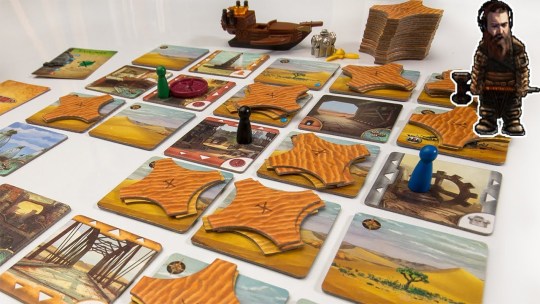
Forbidden Desert - A dead simple survival board game with such a tight rule-set, it lays bare the minimum you could need for an engrossing survival/exploration experience. I have ported the game to the computer in the past and I was very interested in the percentages and probabilities involved. I.e. a game on “Standard Mode” usually gives you a base ~45% success rate on any given action whereas “Hard Mode” puts you at ~25%.
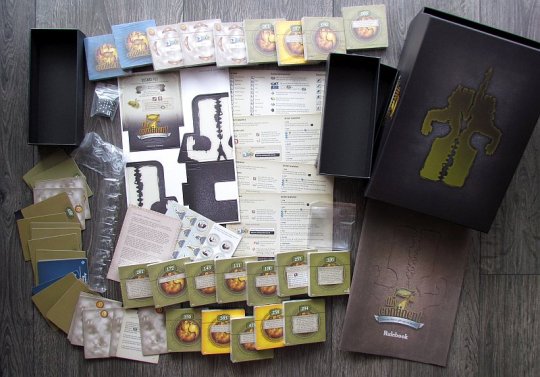
7th Continent - This system has re-written the rules for what is possible in a board game. This game exemplifies the idea of introducing methods of interacting with the system you never considered before. I.e. using a magnifying glass to inspect a card’s artwork, solving visual puzzles with nothing but your brain and receiving cryptic clues that reward you with no special game mechanics, only the knowledge that they exist. I will certainly be taking a page from this book while thinking about Caliban.
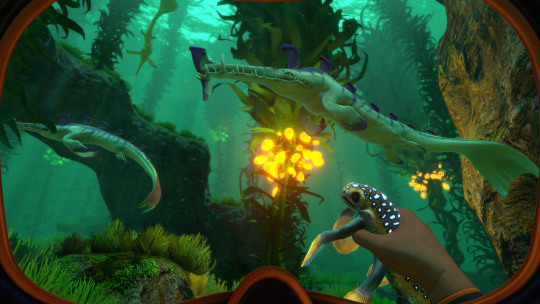
Subnautica - Proves the efficacy of the powerful motivator behind simply wanting to see content. The entire purpose for your explorations deeper and deeper into the depth of an alien ocean is the drive to simply *see*. It is an almost objective fact that the deep sea is l33t, and the game scratches that itch so well. I want Caliban to have a similar drive to see what kinds of exotic and interesting species of softwares you’ll find out in the desert...
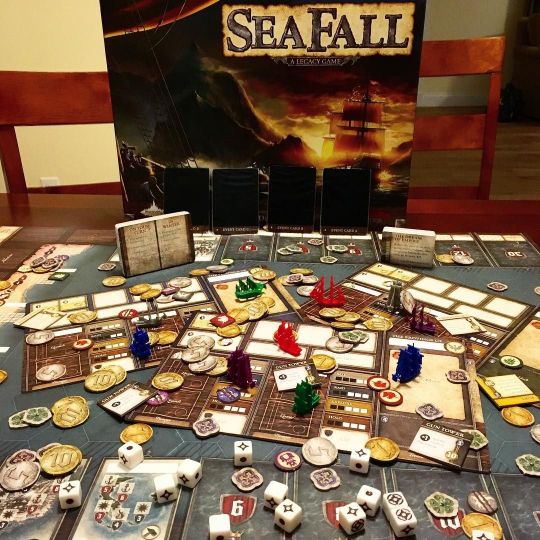
Seafall - This game exemplifies the idea of adding and changing the rules of the game at run-time. Playing through this board game with a group of committed friends was an absolutely exhilarating and unique experience. The game got major flak in mainstream reviews for not having rules that cover the edge cases you’d find yourself in (IRL undefined exceptions LOL) but if you look past that, this game was constantly re-inventing itself as you played. It shifted from competitive resource trading game, to war game, to exploration/puzzle game and towards the end it was a co-op survival game. Not to mention the reward mechanic of physically adding rules to the rule-book by way of stickers... also LOL the box said “batteries included” but you didn’t know what they would be used for until 66% through the game. Genius motivational mechanic.
What the fuck is this?
In my opinion, true puzzle games of quality are very hard to find. My definition of a “true” puzzle game is as follows: A cryptic system in which the tools to untangle it reside within the system itself and can be solved with no outside intervention. In other words, it’s what we lowkey wish the real world was. I do not consider games which rely on randomness, cultural trivia, or overly complex game mechanics to be true puzzle games. Those are excuses for poor game design. True puzzle games can and do exist with *one* game mechanic. True puzzle games are among the hardest in the gaming world. I admire that about them and have actively been seeking them out for years. These are some notable examples that I know of. I will be taking a lot of guidance for how they pace and implement real-world puzzles and look to them for structural guidance on how to implement the ideas that I have for the puzzles in Caliban.
You’ll probably see that certain games are missing that are supposed to be “good”. That’s for a reason and if you want to know why, then message me or just fuck off.
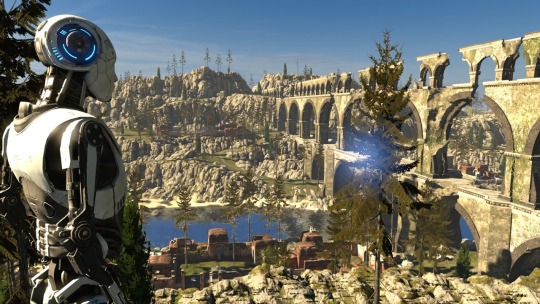
The Talos Principle - Yea, probably my all-time favorite video game. I could gush for pages. However I want to keep this focused on how this relates to Caliban. Specifically, how the puzzles and story relate to the digital nature of the game deeply inspires me. The story *is* the story of a digital consciousness, told through a pseudo-biblical filter. I am going to be taking some pointers from this when I am shaping the myth and story of Caliban.
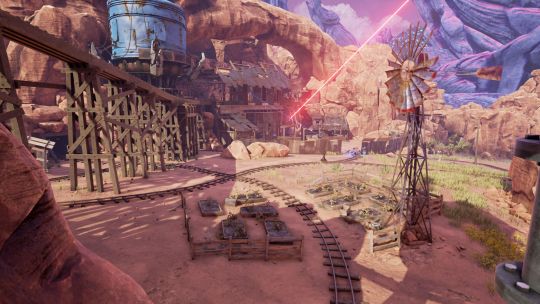
Obduction - The latest game out of Cyan Studios (creator of you-know-what) truly couldn’t give any less of a shit about you or if you come anywhere close to beating it. Yes, to a fault. Its not as confrontational as Hackmud (below) but it certainly dangles a story-carrot in front of your face (which is as obtuse and unsolvable without a walkthrough as the notorious maze puzzle). Most unforgivably, the game is plagued by a fucking stupid walk speed and straight up tedious animations. If it takes more than 5 seconds to input a “code” into your “number lock” to test it, then fuck that and fuck you.
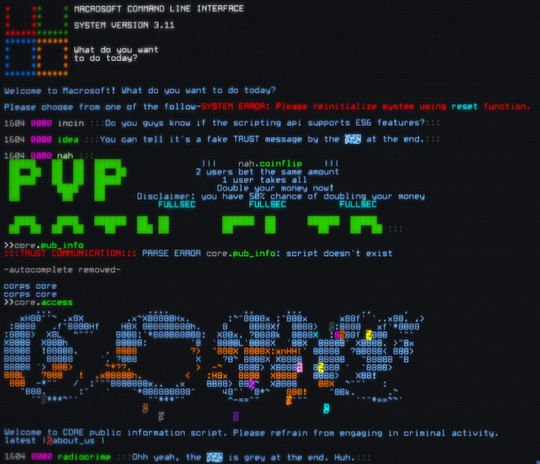
Hackmud - This game makes me LOL. I haven’t settled on how I feel about it and it is the last game I have been seriously into before starting this project. The gameplay here IS building a codebase. The game is a puzzle box you throw your code against and try to make progress. I am thinking about how I would like to integrate coding into Caliban, whether I will detect and forbid automation, hacking, coding etc.. or if I will embrace it. The downside to embracing it is that you alienate your non-coder audience and you start designing challenges under the assumption that your player base is code-savvy. What do you think about this? Sound off in the GIVE FEEDBACK section!
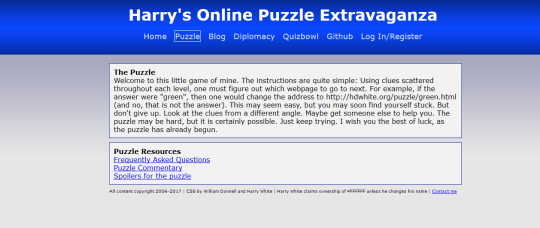
Harry’s Puzzle - I love, love love this game. You can play it in its entirety right here. What I love about this game is how it is always there, always lurking. You can resume your progress just by going to the right URL. You can take your time, maybe years, chipping away at the puzzle, and communities have spring up around it. Maybe, maybe Caliban can aspire to such fame? Such renown? Such infamy? LOL, not my intention, but the ruthlessness and difficulty of Harry’s puzzle is something to keep in mind.
So what’s in it for me?
So, some people just don’t get games. They just don’t. I completely understand that. I mean, at the end of the day, what do you get out of them? What’s the point? “Seems like a waste of time if you ask me...” And beating a game almost always leaves you with a unique feeling of... loss. You shut the game down after the credits and... then what? Did you just waste 10 hours? 10 days? 10 months? I mean, I’m of the opinion that its *cool* to beat a game. Its *cool* to be good at video games, but I completely respect differing opinions.
For Caliban, I want your progress and eventual completion to be tangibly rewarded. I want you to leave the game with pieces of software you could not have gotten from anywhere else. Whether its a nice music box program that plays some chip-tune, or a unique little desktop physics widget, or a piece of interactive poetry, or a desktop sculpture or anything. I want this game to have tangible takeaways, and finally a piece of totally epic trophyware for those who reach the journey’s end.
Here are two games that I feel genuinely reward you in completely unique and satisfying ways and which I will be drawing heavy inspiration from.
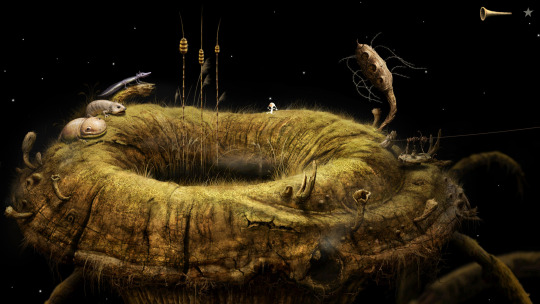
Samorost 3 - The carrot on the stick in this game is music. As your progress through the game, you are simply rewarded with a new instrument track you can then trigger in the special music menu. That’s it. Those are your prizes. Each achievement you get adds new capabilities to your music-making arsenal and if that isn't the most beautiful and wholesome reward system, I really don’t know what is. Check out this link to see it in action. HIGHLY RECOMMEND
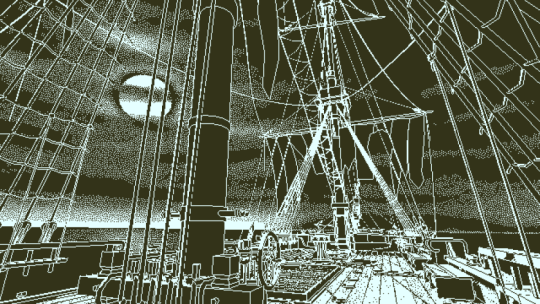
The Return of the Obra Dinn - This game is a utter masterpiece. The reason why I have it way down here in the “rewards” section is because i don’t know why, fuck off. But anyways, the eventual reward for completing this game is finding out what the fuck happened on the Obra Dinn. You are presented with disparate chapters of a story, told mostly in reverse, with a crucial chapter missing. If you don’t complete the game in its entirety, you never get to see this missing chapter and the story remains with a gaping plot hole. This is genius, I mean I’m kind of a nautica-phile so this was enough for me to keep progressing but I just love the idea of holding the story as the final reward. It may seem a given, like “yea you beat the game you get to see the end to the story”, but something about Obra Dinn was different. It wasn’t about seeing the ending, (the ending is actually where you begin) but seeing the exact pivotal moment the story rotates around was an amazing motivator. Thinking about this while I write Caliban.
What are you trying to tell me?
So, something I am not going to do is post my story. The story is something I will not be revealing until I am comfortable with the final release to keep it a surprise. But here are some influences I am taking into account:
The Tempest (Caliban) What, you thought the title was an accident? ;-)
Ok! So, here we are at the end. Woof. You still here? Wow. I love it. If you’re reading this, then welcome to The Inner Circle. Sound off in the GIVE FEEDBACK section and make yourself known. If you think I’m not going to reward “Day One fans” in-game then you’re CRAZY! You’ll be considered a VIP in the project and your constant feedback will help drive development forwards and who knows, maybe you’ll find yourself rewarded in more than one way :-)
Up next will be my roadmap on my first few steps on this journey and some milestones I will be trying to reach in the coming weeks.
Till next time - M
Get CALIBAN: Filesystem Survival
CALIBAN: Filesystem Survival
A file system survival game in which a desert of content is created on your machine.
| Status | In development |
| Author | gentle_virus |
| Genre | Survival |
| Tags | artgame, desktop, Experimental, Exploration, malware |
More posts
- Alpha Update : SANDSTORM!Jun 09, 2019
- Alpha 0.0.3 Cheaters Never WinMar 14, 2019
- Alpha Version 0.0.2Mar 13, 2019
- Bugs Bugs Demo BugsMar 12, 2019
- DEMO IS OUTMar 12, 2019
- Alphs 0.0.1 Demo approachingMar 12, 2019
- State of the Union 2/17/19Mar 12, 2019
- Development Roadmap - Initial ThoughtsMar 12, 2019
- Welcome to the CALIBAN devlog!Mar 12, 2019

Leave a comment
Log in with itch.io to leave a comment.